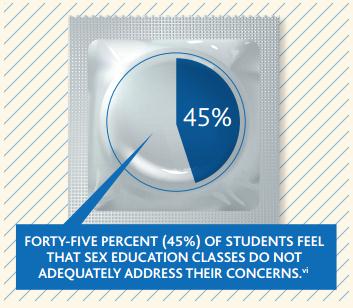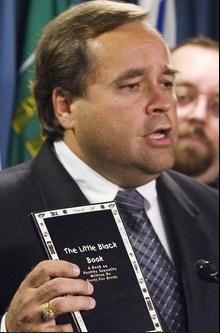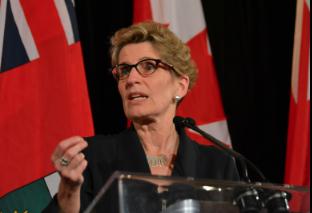
A 2011 Ontario student survey by the Ontario Student Trustees' Association and People for Education revealed 45 percent of students did not feel that sex education classes adequately addressed concerns of a sexual nature. Credit: Courtesy of OPHEA.

Charles McVety, president of Canada Christian College, who led the charge against the updated sexual health curriculum when it was first introduced n 2010. Credit: Xtra file photo
Ontario’s new premier, Kathleen Wynne, has promised to reintroduce a controversial inclusive physical and sex education curriculum that was shelved after conservative religious groups protested in 2010.
Wynne spoke to reporters Jan 27 at her first news conference as premier designate, at Toronto’s Delta Chelsea Hotel.
“We are going to evolve the physical health and sex education curriculum,” she said when questioned by Xtra.
Wynne did not say when the curriculum will be reintroduced, but she said parents can soon expect consultations, which will include education advocacy groups like the Ontario Physical and Health Education Association (OPHEA) and People for Education.
“We have developed curriculum in this province for decades, and we have done it in a way that has integrity,” she said. “We are committed to having a conversation with parents.”
The pledge is welcome news for OPHEA spokesperson Chris Markham, who met with all the Liberal leadership candidates prior to the convention to impress upon them the urgency of reintroducing sex education.
“We have been working hard to ensure the curriculum is not forgotten, so I see Kathleen’s statement as proof our advocacy works,” he says. “Kids need this. When you look at sexual health curriculums across Canada, Ontario lags seriously behind.”
When it was first released in 2010, the curriculum was called groundbreaking because it presented age-appropriate discussions on sexuality, gender and different types of families. But the document, which attempted to update information that is more than 15 years old, was shelved after a backlash from religious groups.
Markham says that an evidence-based sexual health curriculum is long overdue and that parents have been patient. Canadian studies have consistently found that more than 85 percent of parents agreed with the statement, “Sexual health education should be provided in the schools,” he says.
Likewise, he says, students in Ontario do not feel that sexual health education is meeting their needs. According to a 2011 Ontario student survey by the Ontario Student Trustees’ Association and People for Education, 45 percent of students did not feel that sex education classes adequately addressed concerns of a sexual nature.
When the sex-ed debate returns to Ontario, Wynne will likely face criticism from the province’s religious right and conservative parent groups, who have vehemently opposed any sexual health education. In 2011, when asked when his party was reintroducing the curriculum, MPP Glen Murray told Xtra that MPPs in less progressive ridings have difficulty selling it to their constituents. “Rightwing reactionary homophobes just love these issues,” he said.
Markham expects that those groups, including Charles McVety’s evangelical Canada Christian College, will once again go on the attack and zero in on Wynne’s sexuality. He hopes the people of Ontario and the media rise above the inevitable anti-gay rhetoric.
“I’m not sure what her sexual orientation has to do with her ability to lead a province. It’s 2013, and we need to grow up already,” he says.
Wynne is Canada’s first lesbian premier. At her press conference, she said she’s incredibly proud to be a role model for queer youth, but being gay isn’t the only quality that defines her.
“Coming to the legislature I have a responsibility to represent all my constituents, but I have some special responsibilities as well,” she told reporters when asked about her history-making leadership victory.
“I have a special responsibility to young gay people, who might be looking for the possibility of a more accepting world. [But] I’m not a gay activist. That’s not how I got into politics. I’m talking about it today because you’ve asked about it, but I’m not going to spend the next month talking about this.”
Wynne, a former education activist, entered the political boxing ring fighting the Mike Harris government’s Common Sense Revolution in the 1990s. She founded a group that lobbied for better education and joined another led by former Toronto mayor John Sewell and resisted deep cuts to education, The Globe and Mail reports.
Outgoing premier Dalton McGuinty will officially step down Feb 12. Wynne plans to bring the legislature back on Feb 19, when she will be sworn in as premier.
Wynne’s next task will be putting together her cabinet, which will likely include some of her leadership rivals.
Wynne faces many challenges as she takes the helm. Her party sits in third place in the polls. McGuinty, who resigned from office and prorogued parliament in October, left behind a party plagued by scandal, including questions about the province’s troubled Ornge air ambulance service and the party’s controversial decision to relocate two gas plants. Wynne will also have to work to win over teachers after months of labour unrest and tackle a swelling deficit and widespread economic uncertainty.
Her throne speech will frame how she plans to respond to those issues, she said.
“I’m not thinking about [whether the government will fall],” she said. “I’m thinking that we have a good chance at using the momentum that we have built up. I believe there are ways of finding common ground.
“We have an understanding of our challenges and we are going to confront them. We are going to explain to the people of Ontario where there were missteps and where we need to go forward.”
Wynne said her “door will be open” for the teachers’ unions.
“We have to re-engage,” she said. “This is a sector that delivers the most important service that, I think, government delivers. That’s education. So it is imperative that government and decision-makers in the classrooms are working together.”

 Why you can trust Xtra
Why you can trust Xtra


